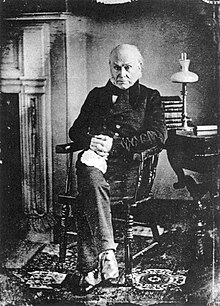
Like most contemporaries, John Quincy Adams's views on slavery evolved over time. He never joined the movement called "abolitionist" by historians—the one led by William Lloyd Garrison—because it demanded the immediate abolition of slavery and insisted it was a sin to enslave people. Further, abolitionism meant disunion and Adams was a staunch champion of American nationalism and union.[1]
He often dealt with slavery-related issues during his seventeen-year congressional career, which began after his presidency. In the House, Adams became a champion of free speech, demanding that petitions against slavery be heard despite a "gag rule" that said they could not be heard.[2] Adams repeatedly spoke out against the "Slave Power", that is the organized political power of the slave owners who dominated all the southern states and their representation in Congress.[3] He vehemently attacked the annexation of Texas (1845) and the Mexican War (1846–1848) as part of a "conspiracy" to extend slavery.[4] During the censure debate, Adams said that he took delight in the fact that southerners would forever remember him as "the acutest, the astutest, the archest enemy of southern slavery that ever existed".[5]
Biographers Nagle and Parsons argue that he was not a true abolitionist, although he quickly became the primary enemy of slavery in Congress.[6][7] Though he, like most anti-slavery contemporaries such as Henry Clay, held the preservation of the union as the primary goal, he increasingly became more forceful for the anti-slavery cause.[6] Remini notes that Adams feared that the end of slavery could only come through civil war or the consent of the slave South, and not quickly and painlessly as the abolitionists wanted.[8]
- ^ David F. Ericson, "John Quincy Adams: Apostle of Union." in David Waldstreicher, ed., A Companion to John Adams and John Quincy Adams (2013), pp 367–382, p 371.
- ^ David C. Frederick, "John Quincy Adams, Slavery, and the Disappearance of the Right of Petition," Law and History Review, Spring 1991, Vol. 9 Issue 1, pp 113–155
- ^ Leonard L. Richards, The slave power: the free North and southern domination, 1780–1860 (2000) p. 44
- ^ Leonard L. Richards, The life and times of Congressman John Quincy Adams (1986) ch 6
- ^ Nagel, Paul C. John Quincy Adams: A Public Life, a Private Life (Harvard UP, 1999). p 348
- ^ a b Nagel, Paul. "John Quincy Adams: A Public Life, a Private Life". p 355. 1999, Harvard University Press
- ^ ; Parsons, Adams, (1999) p 224
- ^ Remini, Adams (2002) p 142
© MMXXIII Rich X Search. We shall prevail. All rights reserved. Rich X Search
